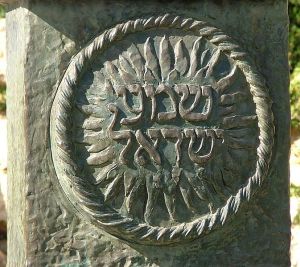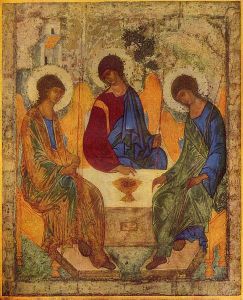Texts: Proverbs 8:1-4,22-31 + Psalm 8 + Romans 5:1-5 + John 16:12-15

Preaching on the Sunday the church commemorates as the festival of the Holy Trinity is full of traps for the preacher, or so I am told. “Don’t preach doctrine,” I’m advised. No one wants to hear a sermon on doctrine, especially the doctrine of the Trinity. It’s a mystery.” And, the best advice of all: “No flowcharts.” So, it is with some trepidation that I have ascended into the pulpit this morning to preach, and worse, to preach about the doctrine of the Trinity.
The Holy Trinity is, indeed, a mystery. But it’s not a mystery the way the pyramids are a mystery, or the way the huge statues on Easter Island are a mystery. We use the word “mystery” to describe those immense, incredible works of humanity precisely as an invitation for someone to solve the mystery. Calling something a mystery almost immediately draws us into the role of detective. Like the old story of the sword in the stone, we approach a mystery wondering if we will be the one to finally release it from its trap.
Or, the other option I suppose, we allow the word “mystery” to scare us away. “The Holy Trinity? Don’t bother giving it a second thought, it’s a mystery…” But that’s not the kind of mystery it is either. In fact, in the realm of Christianity to say something is a mystery is to say that we are called to spend our lives asking questions of it, probing it for wisdom, being shaped by its knots — but not to solve it.
So, with some humility, let’s spend just a short bit of time on this festival of the Holy Trinity considering its mystery.
To begin, as Christians we are the inheritors of a beautiful and ancient tradition of thinking and speaking about God that comes to us from our Jewish sisters and brothers.
Shema Yisrael Adonai Eloheinu Adonai Echad
Hear, O Israel, the Lord is our God. The Lord is One. (Deut. 6:4)

This is the shema, which we read in the 6th chapter of Deuteronomy, the 4th verse, a statement of faith that, for Jews, is about as close to a creed as they get. It is the basis for what we have come to call monotheism, the belief that there is only one God. That God is not one among many.
This inheritance is the entry into the mystery. Not a clue. Not a piece of evidence. But a doorway. We belong to a community with a long and beautiful tradition that has known in its blood that there is only one God. So whatever the Trinity is, it is not three Gods, but one.
But we who are Christians are also a family marked by a very special relationship to God through the revelation of God in the person of Jesus of Nazareth: a living human being who was born, who lived as a teacher of the love of God, who spoke the truth to those in power, who was crucified for confronting the authorities of his day, who was raised from the dead (another mystery of the faith), and who assured us that God would send an Advocate to guide us in truth and continue to instruct us in the paths and promises of God.
Jesus spoke during his lifetime about his relationship to God as being like that of a son to a father, but he muddied the waters a bit there. He said cryptic things that we’ve been reading for the last few weeks. Things like, “whoever has seen me has seen the Father;” (John 14:9) or “I am in the Father and the Father is in me;” (John 14:10) or, this week, “He will glorify me, because he will take what is mine and declare it to you. All that the Father has is mine” (John 16:14)
Jesus is the second person, the second stopping point, in contemplating the mystery of the Holy Trinity. Jesus exists as both God and human, giving humanity new access to divinity — and the other way around. And all this talk about glorification, well… it’s a mystery! But, as is so often the case with scripture and the words of Jesus, it appears to have something to do with teaching us to see the world as God sees it, not as we do.
When I hear the word “glorify” I tend to think of lifting someone or something up with praise and adoration. If I’m glorifying you, then I’m assuming the position of a lowly one so as to draw attention to you, the elevated one. But in Jesus, God is glorified, God is lifted up. And, Jesus says, God will glorify him, God will lift him up.
Glorification, in the realm of God, becomes something altogether different — not the elevation of one over another by acts of praise; but, instead, the mutual sharing of life together, the revelation that our life is shared in and with each other by acts of love and self-giving. Part of the mystery of God in Christ Jesus is the radical reorienting of reality that brings God down to earth, that lifts humanity up to heaven, that gives us a shared body to which we all belong.
The Holy Spirit, the third person of the Trinity whom we celebrated last Sunday at the festival of Pentecost, is that Advocate, the presence of God with us that was promised by Christ. The Holy Spirit is the point in the mystery of the Trinity that breaks open the relationship of God to Jesus and makes that relationship available to each and every one of us.
Here the mystery gets even thicker. Consider this, that for the first three centuries of the Christian church there was widespread disagreement about the nature of this Holy Spirit. Was it God? Was it of the same substance as God? Was it equal with the Father and the Son? Those questions weren’t decided formally until the Council of Nicea (from which we get the Nicene Creed) in the year 325. And, of course, as it is with most decisions in church, the fact that the council voted on it didn’t settle the issue for everyone involved. People continued to struggle to understand the meaning of the Holy Spirit.
This is a wonderful illustration of the words of Jesus from today’s gospel. There he says, “I still have many things to say to you, but you cannot bear them now. When the spirit of truth comes, he will guide you into all the truth…” (John 16:12). Remember, Jesus is speaking these words at the Last Supper. They haven’t yet seen him crucified, or raised from the dead, or appearing among them in the locked room. They aren’t ready yet to understand, much less trust in the mystery of the Holy Spirit. But centuries later the church was able to look back at all that had happened, all that had been said and taught, as well as their own experience of how God was alive with them, through each other, in the Church and they were able to say something new about God’s unity in community.
Living here on the other side of the resurrection, having experienced the power of God through the church, the child of the Holy Spirit, we are in a position to trust in the mystery of the Holy Trinity — not to understand it, not to solve it, but to trust in it.

If we go back to the ancient Hebrew assertion that the Lord is God, the Lord is One, and we pair that with the word from the book of Genesis that gives us these words from God, “let us make humankind in our image, according to our likeness…” (Gen. 1:26) then we arrive at one of the many teaching moments of the mystery of the Trinity. We trust, as a matter of faith, that our God is one. That’s what we’ve been taught since we were children. We don’t have three gods, we have God: the three-in one and one-in-three. And we’ve been taught that we are created in the image of God. But what does that mean? Am I three-in-one? Are you one-in-three?
The power of a mystery of faith doesn’t come from how we untie its knots, but how it unties ours. Here the mystery of the Holy Trinity addresses one of our most basic errors: that we think we exist alone, in solitary. That we can be human all on our own, without relationship to anyone else. That’s certainly how we structure our society. We create the expectation that each person be able to care for themselves in a very narrow way, economically, and we penalize and humiliate you if that is not possible. But we don’t do such a good job of noticing all the ways we are interdependent upon one another for things that can’t be measured with dollars: safety, belonging, friendship, wisdom, respect and love. These things, just as necessary for life, can only come from community. We cannot live, we cannot be human, alone. We can only do it together.
Archbishop Desmond Tutu talks about this concept using and word found in the Zulu or Xhosa languages, ubuntu, which means (roughly translated), “people are people through other people.” We aren’t fully human alone, we are only fully human together. And the mystery of the Holy Trinity is ready to teach us this: that we are created in the image of a God whose own life takes place in community. We are made in community just as God exists in community; and we belong to the one body of Christ, just as God is one.
Shema Yisrael Adonai Eloheinu Adonai Echad
Hear, O Israel, the Lord is our God. The Lord is One.
The essence of a mystery, the way we use the word in church, is not to unravel it but to dwell within it. To let it unravel you, and then bind you back up. This is just one more way, I suppose, that we are created in God’s image: that we, too, are mysteries. Each of us many in one, and one among many. We do not need to be solved, only loved, and that is the gift that the Holy Trinity wants to offer us: the open door to life lived in the communion of God who creates, redeems and sustains us; God who surrounds, accompanies and empowers us; God around us, toward us, through us; God our parent, our sibling, our family. God in all, for all, forever.
Amen.
Dear Rev. Erik:
I stumbled across your sermon and found it to be very uplifting. I am an Orthodox Christian and found the sermon to be very deep theologically. May God bless your ministry.
In Christ,
Mark